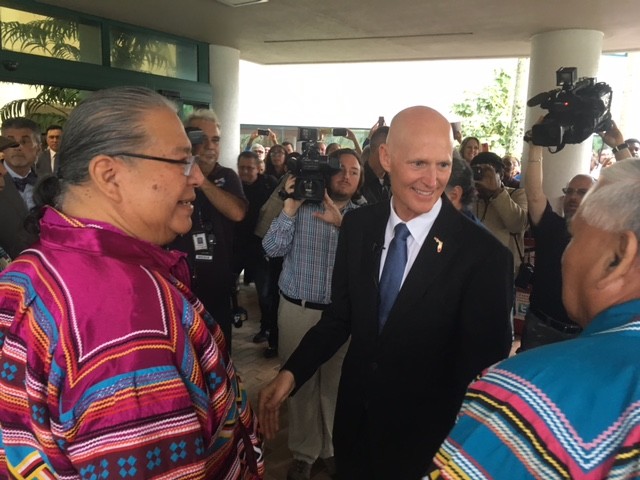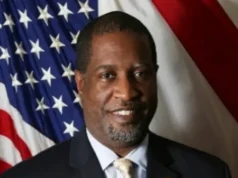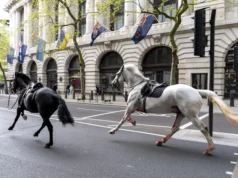
For those of you who can avert your eyes from Iowa for a few moments, there was plenty of politics to witness in Hollywood Monday morning.
Florida Gov. Rick Scott visited the Seminole Tribe of Florida’s headquarters as the Seminoles unveiled details for a $1.8 billion expansion program, centered on new hotels at their Hard Rock casinos in Hollywood and Tampa. The features include ritzy pools, hotel villas and upscale restaurants – all of which would attract vacationers from South America, Asia and everywhere else.
Scott, of course, is all about jobs, so the tribe happened to mention that the projects represent 14,585 construction jobs and 4,867 new full-time jobs. The tribe also had current employees offer testimonials, and the governor was greeted by about 500 employees lined along the streets and the hallway to the Seminoles’ headquarters on Stirling Road, some of whom held signs saying “Thank You, Governor Scott.”
(Interestingly, a similar rally took place when then-Gov. Charlie Crist shepherded the first-ever Seminole compact all the way through the legislature, including Marco Rubio. You see, Christ ran against those two guys in recent years and lost.)
Scott and the Seminoles have a common goal: They want the $3 billion, seven-year compact they both signed to be approved by the Florida Legislature. The tribe would be able to add craps and roulette and continue blackjack, which technically legally expired in July but is still being dealt at five of the tribe’s properties. The compact proposal is still in committee, and could be derailed by those opposed to gambling, as well as legislators representing racetrack casinos who feel as though the one portion or another of the Seminoles’ bargained exclusivity would cripple them.
The tribe’s presentation solidifies a shift in customer focus: It’s clear they’re after customers with deep pockets. The Seminoles recently created an aviation division – to exclusively fly their best patrons – and the plans for the second hotel in Hollywood include villas, which would attract families that might stay up to a month.
“Our business model is not just to prey on the local player who has $20 or $30 in his wallet,” Seminole Gaming CEO James Allen said.
The current hotel holds 500; the new one would add about 800 rooms, and is shaped like a guitar. (Hard Rock… music… guitar.) The renderings include a large pool area and sunken water chairs in Hollywood, and a rooftop pool in Tampa, where Allen notes space is tighter: Hollywood is a 100-acre property, Tampa about 33.
“The tribe has the financial resources to do it as well or better than anybody,” he said, noting that the Hollywood Seminole Hard Rock could rival places such as Atlantis, and be compared to Las Vegas’ Bellagio, which even though it was built in 2002 is considered one of the city’s top venues.
“When you spend money or capital in a frugal way, you don’t create something that’s iconic… The Bora Bora experience.”
“The compact is not about adding more machines. For those trying to derail it, it’s just not accurate.”
Concluding his presentation, Allen said, “Well, that’s about three or four years of work put into 15 minutes.”
In some ways, the tribe’s presentation to Scott was a case of preaching to the choir. He’s already approved the compact. It’s the Florida Senate, House and committees along the way that need to be sold. (By the way, the conference was live-streamed and publicists made sure those in Tallahassee knew of the event.)
But Scott loves to hear about jobs and people, and he, Allen and tribal members sat at a business table with bottles of water in front of them for more than an hour.
“People want to hear how it impacts a person,” he said.
So seven people whose work would be affected if the compact didn’t go through spoke, including a lawn service owner, two blackjack dealers and a floor supervisor and a NYY Steak line cook from Haiti, who sobbed the moment she told Scott that her sister had died and she was taking care of her five children.
Scott was at his best with all of them, joking with the cook: “Do you make a good steak?” he asked. He also asked the speakers about their families.
A common theme among the speakers was uncertainty. Until they find out if the compact passes (some in Tallahassee are pessimistic and the tribe is running TV ads touting it, seeking public support), they’re not going to make major purchasing decisions. And they’re scared. They made some good points about how many people like them are sweating it out these months.
The tribe says about 3,600 jobs would be eliminated if the compact is not approved and the table games are shut down. Allen (correctly) demurred on whether the hotels would go up if the compact didn’t pass, citing the other facets of gambling being discussed in the legislature, including a lawsuit originating in Gadsden County that could torpedo their exclusivity – but also their requirement to make payments to the state.
The proposed compact is the most lucrative in the nation, which is not surprising, considering the Seminoles are the most successful Indian casino operation, with more than $2 billion per year in revenues. They also out-delivered what they promised to the state in the past five years, paying out $64 million more than the $1 billion promised.
“What the Seminoles have done in this state is remarkable,” Scott said.
Allen noted that tribal compacts have been especially effective as a firewall against gambling expansion in states with only Indian casinos, such as Connecticut, Oklahoma and California. There are eight racetrack casinos in South Florida, who could see their slot tax lowered from 35 percent to 25 percent and could begin to offer blackjack capped at $15 per hand if the compact goes through.
At a post-event news conference, Scott said he respected the legislature’s process, but also said he was satisfied with his negotiations with the tribe.
Standing next to Allen and Chief James Billie, Scott said, “We did our part.”
Nick Sortal, SouthFloridaReporter.com, Feb. 1, 2016
[/vc_message]











